A trial studying a higher dose of Biogen’s spinal muscular atrophy (SMA) drug Spinraza (nusinersen) has met the primary endpoint in a cohort of infants with SMA.
Data from the Phase II/III DEVOTE study showed that at six months, infants receiving the higher dose regimen had a statistically significant improvement in motor function compared to a prespecified, untreated control group from ENDEAR, one of the two pivotal studies that supported regulatory approval for the standard 12 mg dose of Spinraza.
The three-part study (NCT04089566) enrolled 145 patients of different ages and SMA types. The Part B cohort included 75 treatment-naïve children with infantile-onset SMA. The investigational higher dose regimen of Spinraza includes a faster loading phase with two 50 mg doses given 14 days apart, and a higher maintenance dose of 28 mg every four months. The approved regimen involves four loading doses given at 14-day intervals followed by a maintenance dose every four months with a recommended dose of 12 mg.
Patients in the higher dose group had an adjusted average difference of 26.19 in CHOP-INTEND scores compared to the sham group. CHOP-INTEND is a tool used to assess motor function in infants with neuromuscular disorders like SMA. Secondary outcomes also favoured the higher dose, which showed a positive trend over the current 12 mg regimen on key biomarker and efficacy measures.
The higher dose was generally well tolerated, with adverse events consistent with SMA and Spinraza’s known safety profile. Serious adverse events were less frequent in the higher dose group, at 60%, compared to the 72% incidence seen in the 12 mg group.
The 12 mg dose of Spinraza is approved in more than 71 countries to treat infants, children, and adults with SMA, a genetic disorder characterised by the loss of motor neurons. Spinraza is an antisense oligonucleotide (ASO) that targets the underlying cause of motor neuron loss by continuously increasing the amount of full-length survival motor neuron (SMN) protein produced in the body.
Spinraza pulled in $1.74bn in sales for Biogen in 2023, as per the company’s financials. Sales of the drug are set to decrease steadily year-on-year, generating $1.13bn in 2030, according to GlobalData’s Pharma Intelligence Center. In Biogen’s 2023 earnings presentation, the company blamed the drop in revenues on shipment timing, competition, and pricing pressure outside the US.
GlobalData is the parent company of Pharmaceutical Technology.
Biogen said it now plans to apply for regulatory approval of this investigational dose regimen.
In the announcement accompanying the data, Stephanie Fradette, head of the neuromuscular development unit at Biogen said: “While there has been remarkable progress in the treatment of SMA, there remains significant unmet need. Building on the well-characterised profile of Spinraza established over the past 10 years, we continue to explore the potential for maximising efficacy outcomes while maintaining our commitment to safety.”









